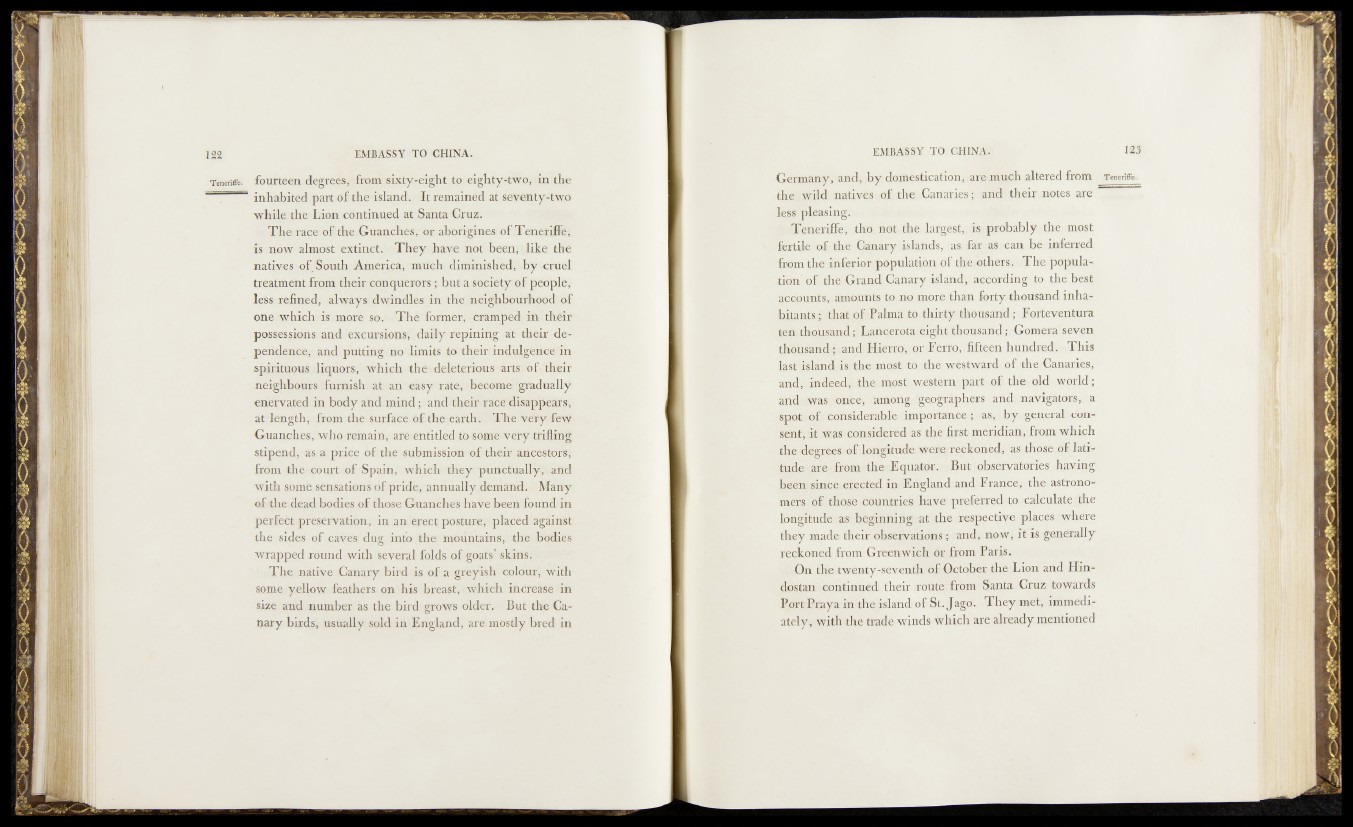
T*en'eriffe. fourteen „degrees^ from six (freight to dgh^--two, in the
inhabited part of the- island.I It remained atsevehty-two
while the Lion continued at Santa Cruz.
The race of the_Guanches, or aborigine® of Teneriffe,
is now almost extinct.* They have mot been, like the
nativessbf South America, much diminished^ byAituoi
treatment from their conquerors; but a-society©! peripldj
less refined, always dwindles' in the neighbourhood’ o f
pne whicfiris more s®s< Thedfermer, cramped ini 'their
possessions and excursions, daily repining at' t«keay ,d#-
pefidonb^ and pitting» no limits to theirundu|g.SlM#ii!'n
spirituous . liquors,: which the^ deletgriops arts: of- ’their
neighfamim-1 fnmi sh at an -easy ratejnbeoome igradually
«i^Yaied in body aSwlimind; andr^rf-rl^dlsaplfei^si
at length, from the^surfaceLdf the’earthdifWhSs Vdryde-'#
Guanehes, who remain,"amenti-tled to somewei^'4“rii.in^
stipend, its. a price of the submission of their anoestoirq
ffem fthe*;oourt of Spain, which they^fpunactnallyi/^nd
with some senmfeni of pride, annually demand. Many,
of the dead bodies of those Guanehes; have been found in
perfect preservation, in an'ereet posture,5 placed against
the sides of eaves-, dug into the- mountains," the bodies
wrapped-round with-several folds of goats’ skins. - j
isfflft^-i^iYO'Gaaiar^bird is of a grey-ish colour* with
s.Q.me yellow feathers .on his breast, whfeh iricrease in
sise and number as the bird grows older. But the Canary
bkdsi, usually soldi in England, are* mostly bred in
Germany, ands; b y dorpg^ti^afeieih j ia.r^^'^h altered from
the':)wild native^- of and? thefr apptes are
.fegplkpfeftsin g.
- Teneriffe, .thpi.ridt-.the largest,-fibprobablpdhe- most
fertile,©fy'bhb Canary; islands, iayfar- a^can-dre inferred
frpmthe iriferiot;p0puktiQ4a^f4hh}ft*hers.' The popula-
tidn ofer-hy Grande Ca nary^isf J^/nfding' to^||ie best
accounts; >simountt t^jlk^ippre) than tfcg^thausa^d inha-
bilarits^ fthat -of»Bafpa t^ibirby Forteventura
ten* thousand ;* fep^r|.|ay©ighil^hpusaBd ;/Gpmera; seven
thoMSand ; and Hierro, t'm ;Fpr isp?; eri huridredU This
kst'-feland-iss'fehfenioM tp; the i westward - of the .Canaries,*
and ^ indeed/' theRmost western part oft theyplfl w orld;
aridWas •.one@//araongdgeQgraphers andymavigators,. a
spot' of ''.considerable impnrtslmeef^yas, byugeheral, con-»
sent,-it w-as,; considered?as the first meridian»,;from which
ths&kkgr^es-of longitude; ■vterd re&koriedj' as* thosse>j(oft lati-»
tude are from the Equator. Btitvobsefvatories having
beemsinceid^ected in Englandyand France, thg; astrono1J
mors of those counlsriesiiih'ave'.pre&fcred-’to^&ulatedhe
longitude .as- beginning, at the xlesppedv^rldacesrrwbere1
they, made their observations; ands now} it"is generally
reckoned from Greenwiefedr^from Paris. .
On the twenty-iseventih of OctobjeEJhddbi'W^and Hin*-
dostan continued, their route from Santa Cruz towards’
Port Praya iri theMand o£i§$. Jago'. They.-met, immddfr
ittely, with the trade winds which are already mentioned'
Teneriffe.